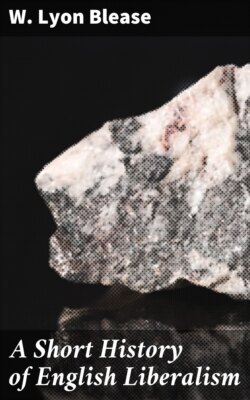Читать книгу A Short History of English Liberalism - W. Lyon Blease - Страница 4
На сайте Литреса книга снята с продажи.
ОглавлениеThe badness of this government of less efficient races lies not only in its possible, and almost inevitable, exploitation of those races themselves, but in its reaction upon the people of Great Britain. There are very few men who can occupy themselves even with the honest and disinterested management of the affairs of a subject people without suffering some deterioration of their love of liberty. However benevolent despotism may be, it is always despotism. The essence of such government as that of India is to dispose of the fortunes of a people according to our own opinion of what is best for them, and not according to theirs. When it is bad, it is tyranny. When it is good, as it nearly always is, it is indulgence. It is never responsibility. It never seriously contemplates the time when the subject shall control his own affairs, or shall even be associated on equal terms with the foreign conqueror. Those who grow accustomed to this absolute power can never work comfortably with free institutions, and the whole of the governing race tends to become infected with the disposing habit. The business of government becomes more than the spirit of it, the mechanical successes of administration are applauded, while the stultification of the general mind is overlooked. Efficiency is exaggerated at the expense of freedom, criticism of the Ministry is treated as insolence, and the right of every intelligent man to interest himself in the affairs of his own country is subordinated to the convenience of officials.[27] The official always looks up and not down for approval and censure, and he cannot depress the eye of his mind when he returns home from one of our foreign dependencies. The Imperialist revival of the last thirty years has thus coincided, not only with the neglect of domestic affairs, but with the active suppression of domestic freedom. The foremost champions of the House of Lords in 1909 were a retired Viceroy of India and a man who, after a successful career in Egypt, had been the mouthpiece of British insolence in South Africa. The best name in the list of the opponents of Woman Suffrage is that of the greatest despot that Egypt has ever known. "Is it not just possible," asked Cobden in 1860, "that we may become corrupted at home by the reaction of arbitrary political maxims in the East upon our domestic politics, just as Greece and Rome were demoralized by their contact with Asia?"[28] No Liberal who has watched the joint progress of Imperial expansion and domestic reaction, which has taken place since Cobden's death, can answer that searching question in the negative.
The foregoing examination will be sufficient to indicate the scope and the method of the following chapters. They attempt to describe the political growth of the country, from a time when power was confined to a small disposing class, to the present day, when we have reached a well-defined stage on our advance towards complete equality of values. They also deal with the varying fortunes of Liberal ideas in foreign policy. The process seems to the writer to resemble the change from the old Ptolemaic to the new Copernican system of Astronomy. The old astronomers believed that the Earth was the centre of the Universe, and that the planets revolved about it. The new astronomers discovered that the Earth was not the centre, and that the other planets, though they had certain relations with and attractions for the earth, actually were, in the main, independent of it, and revolved, like it, about a common centre in orbits of their own. Similarly Toryism imagined that the unprivileged sex, classes, and creeds existed for no other purpose than fulfilling those duties which related to itself, and for enjoying those rights which proceeded from itself. It has been compelled to recognize that other individuals, however united with the dominant class for certain limited purposes, have their independent interests, orbits, and personalities. The writer cannot pretend to be indifferent, as between Liberalism and Toryism. But the last chapter will be sufficient proof that he is not over-full of the spirit of mere party.
